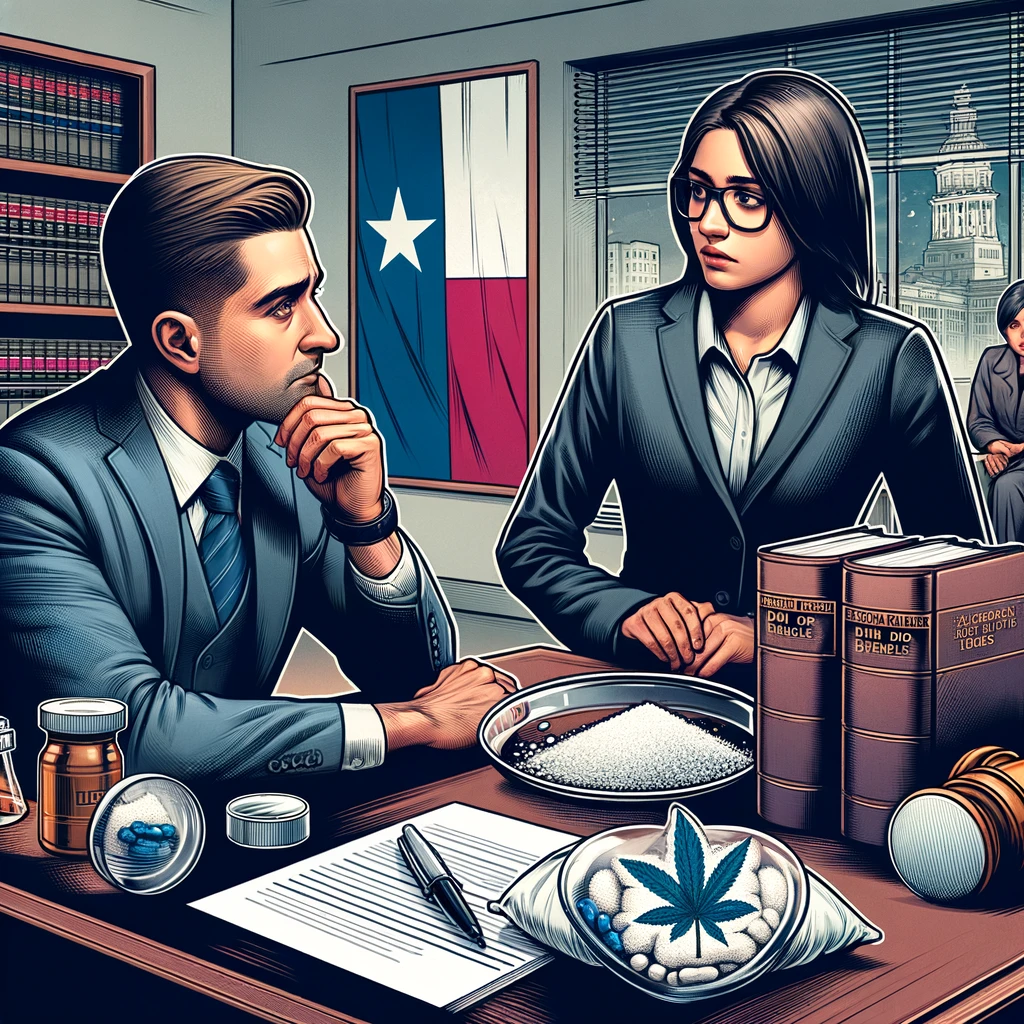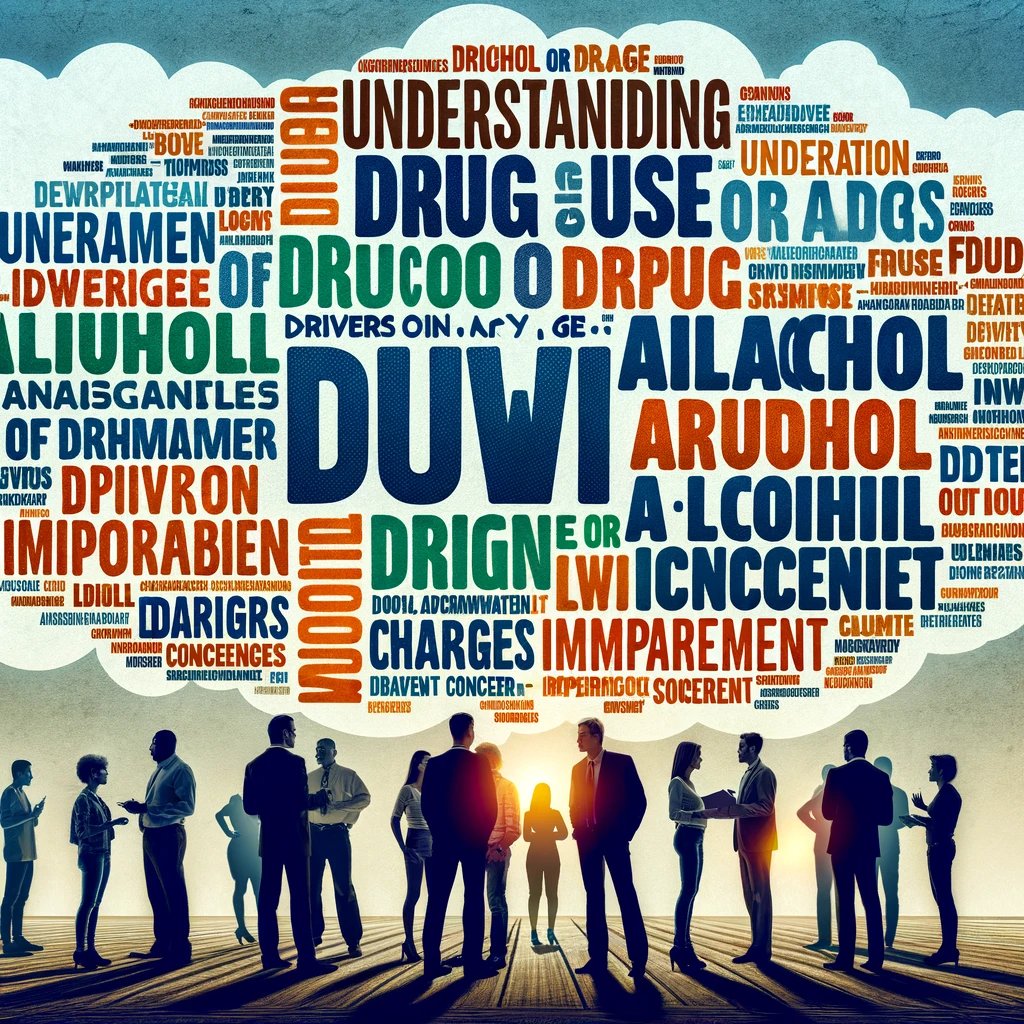
In Texas, the impact of drug use on DUI and DWI charges has become a critical concern. The state’s stringent laws reflect the seriousness with which it approaches driving under the influence. This article delves deep into Texas law, offering valuable insights for anyone navigating these waters. Let’s take a closer look at drug use impact on Texas DUI and DWI charges.
Welcome to the Wild West of Texas Law: Navigating DUI and DWI Charges
Imagine cruising the vast Texas highways, wind in your hair, music blaring. Life is good, right? Now, picture this: flashing lights in your rearview mirror shatter the peace. Your heart sinks. Suddenly, you’re not just a driver; you’re a suspect.
Why?
Because in Texas, driving under the influence of drugs is a serious no-no, rivaling the infamous shootout at the O.K. Corral in its ability to land you in hot water. We’re talking about the kind of trouble that sticks harder than BBQ sauce at a Texan picnic.
Now, before you think, “That’s not me—I don’t even drink!” let’s get one thing straight: Texas law doesn’t care if you’re high on life, caffeine, or something less legal. Impairment is impairment, and it can lead to those dreaded DUI and DWI charges.
So, why should you keep reading about Drug Use Impact on Texas DUI and DWI Charges?
Simple: Knowledge is power, partner. Understanding the “Drug Use Impact on Texas DUI and DWI Charges” can keep you out of the slammer and cruising those roads freely.
This blog post will saddle you up and guide you through the Texas legal landscape, where DUI and DWI aren’t just letters; they’re life-changers. We’ll share tales from the legal frontier, demystify the sobering reality of drug-impaired driving, and arm you with the know-how to avoid a legal showdown.
Short answer?
Stay informed, stay safe, and stay reading if you value your freedom and your driving privileges in the Lone Star State!
Understanding Drug Use Impact on Texas DUI and DWI Charges
In Texas, DUI charges typically apply to individuals under 21 who operate a vehicle with any detectable alcohol. Conversely, DWI charges pertain to drivers of any age impaired by alcohol or drugs. Texas law does not differentiate between illegal drugs, prescription medications, or over-the-counter substances in DWI cases. The primary concern is impairment, irrespective of the legal status of the substance consumed.

The Legal Ramifications of Drug Use in DUI/DWI Cases
The legal landscape for drug-related DUI and DWI charges in Texas is complex. Law enforcement uses field sobriety tests and chemical testing to determine impairment. A positive drug test can lead to a DWI charge, mirroring the legal process for alcohol-related offenses. The prosecution does not need to prove the amount of drug consumption, only that it impaired the driver’s ability to operate a vehicle safely.
Contrasts Between Alcohol and Drug-Related Offenses
The distinction between alcohol and drug impairment in Texas law is significant. While alcohol impairment can be measured using BAC levels, drug impairment lacks a standardized metric. This discrepancy introduces challenges in law enforcement and legal proceedings. The state relies on DREs to identify drug impairment, but the subjectivity and variability of drug effects make legal battles complex and nuanced.
Real-Life Scenarios: Learning from Case Studies
Analyzing real-life cases provides context and understanding. For instance, a Texas driver recently faced severe penalties after causing an accident under the influence of prescribed medication. The case underscored the legal system’s lack of leniency for drug-impaired driving, emphasizing the importance of understanding medication side effects.
Penalties and Consequences: A Stern Warning
The penalties for drug-related DUI/DWI offenses in Texas are severe. First-time offenders can face significant fines, license suspension, and even jail time. The consequences escalate with subsequent offenses, reflecting the state’s zero-tolerance policy. This stringent approach aims to deter impaired driving and ensure public safety.
| Offense | Penalties and Consequences |
| First-time DUI/DWI | Fines up to $2,000; Up to 180 days in jail; License suspension for up to 1 year. |
| Second-time DUI/DWI | Fines up to $4,000; One month to one year in jail; License suspension for up to 2 years. |
| Third-time DUI/DWI | Fines up to $10,000; Two to ten years in prison; License suspension for up to 2 years. |
| DWI with a Child Passenger | Fines up to $10,000; Jail time up to 2 years; Child Endangerment charges. |
| Drug-Related DUI/DWI | Similar to alcohol-related charges; May require drug education or rehabilitation programs. |

Navigating Legal Defenses: Strategies and Solutions
Defending against a drug-related DUI/DWI charge in Texas requires a nuanced strategy. Legal defenses often focus on the reliability of testing methods or the validity of the traffic stop. Experienced legal counsel can challenge the evidence, arguing for procedural errors or questioning the interpretation of impairment signs.
The Dangers of Drug-Impaired Driving: An Unforgiving Reality
The dangers of drug-impaired driving cannot be overstated. Drugs can drastically impair cognitive functions, reaction times, and motor skills. The risk of accidents increases significantly, endangering the driver and others on the road. Awareness of these dangers is crucial for all Texas drivers.
Proactive Measures: Education and Prevention
Texas has taken proactive steps to curb drug-impaired driving. Educational campaigns and school programs aim to raise awareness. State initiatives also include checkpoints and increased law enforcement visibility. These measures, along with community outreach programs, are designed to reduce the prevalence of impaired driving.
Looking Ahead: Legal Trends and Changes
The legal landscape for drug-related DUI and DWI charges is continually evolving. Texas lawmakers and advocacy groups are working to refine detection methods and legal definitions. Staying informed about these changes is essential for Texas residents and legal practitioners alike.
Support Systems: Legal and Rehabilitative Resources
For those facing charges, Texas offers numerous resources. Legal aid organizations and defense attorneys specialize in DUI/DWI cases. Rehabilitation programs and support groups provide necessary assistance, helping individuals recover and move forward.

In summary of Drug Use Impact on Texas DUI and DWI Charges
The impact of drug use on Texas DUI and DWI charges demands attention and understanding. From the intricacies of Texas law to the real-life consequences of impaired driving, the issue encompasses various dimensions. As legal professionals, our role is to inform, guide, and assist individuals navigating these challenges. By fostering awareness and providing comprehensive legal support, we contribute to safer roads and more informed citizens in Texas.
Riding Off Into the Sunset: The Road Ahead in Texas DUI and DWI
Let’s wrap this rodeo and saddle up for the journey ahead, y’all. Navigating Texas DUI and DWI charges? It’s like trying to ride a bull named “Legal Consequence” – thrilling but risky.
Remember our tale of the unsuspecting driver, caught in the headlights of Texas justice? That could be any of us. But armed with knowledge and a touch of Texas grit, you can steer clear of those flashing lights and keep your freedom intact.
So, what’s the takeaway on drug use impact on Texas DUI and DWI charges, partner?
Simple: Driving under the influence of anything in Texas is as wise as a skunk at a lawn party. Not good. Whether it’s the allure of the open road or just another night out, keep it clean, keep it sober, and keep it within the bounds of the law.
The short answer for the road-savvy Texan:
Respect the law, respect yourself, and respect the road. That’s how you avoid a legal showdown at high noon.
Until our trails cross again, keep your boots tight, your coffee strong, and your driving sober. Here’s to safe travels and clear horizons, Texas style!

Other Related Articles:
- Consequences and Legal Options: Probation Violation In the Texas Penal Code
- High Stakes: Understanding the Dangers of Police Pursuits
- DUI and DWI: The Alcohol Marijuana Dilemma
- Conquer CPS Drug Testing
- Navigating DWI: Texas Laws on Marijuana and Alcohol
- Texas’s Zero Tolerance Laws for Underage Drinking and Driving
- Exploring DUI and Marijuana Laws in Texas
- Understanding DWI Laws in Texas: A Closer Look
- The Impact of Traffic Violations on Your Driving Record
- Narcotic Anonymous and Other Support Groups In Texas
Frequently Asked Questions:
An offense DWI in Texas can result in fines, jail time, license suspension, and mandatory education programs.
A DUI is issued to drivers under 21 with any detectable alcohol. DWI is issued for drivers impaired by drugs or alcohol above the legal limit.
Getting a DUI in Texas can lead to fines, community service, license suspension, and mandatory alcohol education programs.
In Texas, a DUI can sometimes be reduced to a lesser charge like reckless driving, depending on the circumstances and legal representation.

